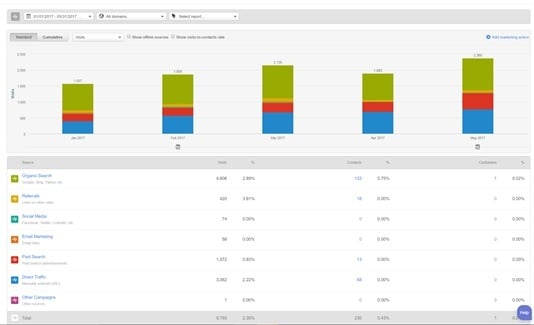
The Difference Between HubSpot Vs Pardot
One of the common questions our agency is asked is what marketing automation software platform clients should choose. We think they’re all good tools, and certainly add a strong dose of measurability and analytics to the marketing programs being implemented. And we love those analytics.

Today, as we’ve now become one of HubSpot’s newest Platinum Level Value Added Resellers, we thought we’d share a few opinions we have on how Pardot and HubSpot compare. Certainly, we’re a bit biased toward HubSpot, as we’re proud to have achieved Platinum status as one of just 100 VARs out of HubSpot’s 3000+ VAR community. However, we tend to do more HubSpot work more so because the bulk of our clients have chosen that tool, not because we’ve insisted they make that choice.
When asked to compare, here’s what we share:
- It would be unusual for us to tell an existing customer of either HubSpot or Pardot to rip it out and migrate to another. They’re both great tools, and the incremental advantage of one over the other would be slight, compared to the time and hassle of a migration project. They’re both rated highly by users on G2 Crowd and other tools.
- That’s not our advice if a company is using a small-company tool such as ActOn, ClickDimensions, InfusionSoft or others that are at a lower tier price point. Those tools are fine for email blasting and building simple landing pages, but run out of steam quickly when doing advanced lead scoring, automation routing, advanced workflows and database segmentation.
- Pardot’s a good tool, and they’re owned by Salesforce CRM. But it’s a fallacy to think that because Salesforce recently bought Pardot that integration is somehow easier or simpler. Integration with both tools to Salesforce is very easy to achieve. Because HubSpot is the largest company in this space, every CRM has made it their business to simplify integration with HubSpot. Salesforce is an investor in HubSpot as well, again because it’s a market leader.
- It’s tough to keep up with the pace of innovation HubSpot provides marketers. Each year there are dozens of improvements – not bug fixes – that make digital marketing more powerful and effective. We don’t see the same pace of improvement with Pardot, though.
- Both tools make it easy to do the basics; build landing pages, blog posts and email. HubSpot’s tool is more powerful when adding sophistication, in terms of lead scoring, database segmentation, advanced workflows, smart call-to-action buttons and smart lists. It’s easier to build workflows and control how prospects move from initial lead to marketing-qualified lead to sales-qualified opportunity in HubSpot. Pardot suffers from a lack of a big-picture reporting tool that HubSpot has, which shows traffic and lead flow by source. It’s a quick and powerful dashboard for most marketers.
- They’re both priced the same, although Salesforce has gotten very aggressive about discounting Pardot to acquire new Salesforce CRM customers.
- We like that HubSpot has begun offering an integrated CRM tool to fill out its feature set. At this stage, though, it’s in its early life cycle and good for small sales teams. Larger sales teams would need a more fully-featured tool such as Salesforce.
- HubSpot’s online training is tremendous, with hours and hours of tutorials. Their customer service support is immediate and even connects you to people! Real people!
- For those who ask about Marketo and Eloqua, we don’t have a lot of clients using them. They’re ideal for billion-dollar global and dispersed enterprises. Frankly, they’re an over-buy for most companies.
We believe that marketing technology is a competitive advantage for companies today. Everyone has a website. Everyone has landing pages and content offers. Everyone’s pushing out emails. However, using technology with more sophistication enables one company to get more quote requests and sales opportunities than their competitors. That’s the test of the digital marketer today: what’s my cost per sales qualified opportunity, what’s my average days to close, and how can I use technology and better marketing to improve both of those metrics. The right marketing automation tool will help do that.
Marketing automation tools have become quite powerful today, with a wide range of choices for digital marketers. Any tool is a dramatic improvement over the buy-and-hope methods of the past. But choosing the right platform for your organization requires the same thoughtful due diligence as when investing in any new technology tool.


